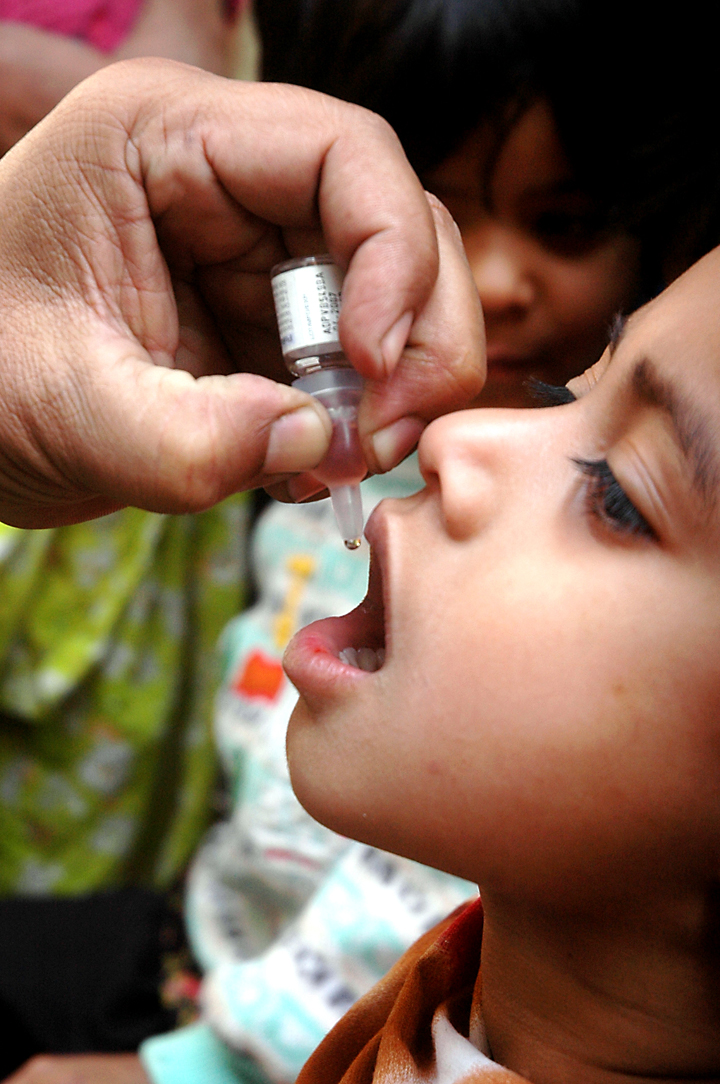Muhammad Sirajuddin, chief health officer in Sahiwal District, Punjab Province, confirmed polio in a five-year-old girl on 2 January. This is a blow to the anti-polio campaign, given that the district was among those ranked “polio-free” by the Punjab government. Six children who lived with the infected child are now also being tested, Syed Qamar Shah, the district surveillance coordinator for polio, said.
The first case in 2009 comes after a difficult year: The Global Polio Eradication Initiative (GPEI) has confirmed 118 cases during 2008 in all four provinces of the country.
This compares rather poorly with 2007, when 32 cases were detected, according to GPEI. There has been an upward trend over the past few years with 28 cases confirmed in 2005 and 40 in 2006.
The World Health Organization’s (WHO) map of poliomyelitis in the world as of November 2008 lists Pakistan among several countries which reported indigenous polio viruses.
The need to more effectively combat polio has been taken up as a government priority. A major new inter-ministerial oversight body for polio eradication was set up in November by Federal Health Minister Mir Aijaz Hussain Jakhrani, who has repeatedly stressed his determination to stamp out the disease.
Pakistan remains one of only four countries in the world where polio is still endemic, the others being Nigeria, India and Afghanistan.
However, experts point out that in order to overcome the problem, it is important to properly understand the reasons for the resurgence.
"It is not enough to simply blame the problem on refusals by parents. Such refusals happen only in areas where Taliban militants are in control [in the northwest of Pakistan], but we have seen cases crop up everywhere in the country," Fauzia Tariq, a Lahore-based doctor said. For an earlier IRIN report on why polio is spreading in Pakistan, click here.
North West Frontier Province polio programme coordinator Muqim Khilji told IRIN the province registered 32 cases in 2008. He said one chief strategy was to "immunise Afghan children on entry into Pakistan".
Health officials in Pakistan have expressed concern that the polio virus is being brought across from Afghanistan. WHO echoes this view, saying persistent pockets of polio on the border between Afghanistan and Pakistan are among the key epidemiological challenges.
The national manager of Pakistan's Expanded Programme on Immunisation, Hussain Bux Memon, told IRIN a factor behind the increase in polio cases was a lack of awareness.
Diarrhoea
"If a child is suffering from diarrhoea when the polio drops are given, they may not be absorbed properly so the child may not be protected," he said. Diarrhoea is endemic in the country, doctors say. Vaccination teams, who will begin a countrywide anti-polio drive later this month, have been instructed to ask parents if a child is suffering any infection before providing the polio drops.
"I did not know an upset tummy could be an issue. But when I took my child to the Children's Hospital in Lahore for polio drops they asked me to come back when he was well," said Sughran Bibi, the mother of Mohammad Fayyaz, aged 10 months.
Administrative loopholes in vaccination drives, notably in Sindh Province, and a reported failure to cover all children, are also being examined by WHO advisers and local health officials. The extent to which these flaws are plugged may determine the success of the anti-polio campaign in 2009.
kh/at/cb
This article was produced by IRIN News while it was part of the United Nations Office for the Coordination of Humanitarian Affairs. Please send queries on copyright or liability to the UN. For more information: https://shop.un.org/rights-permissions





